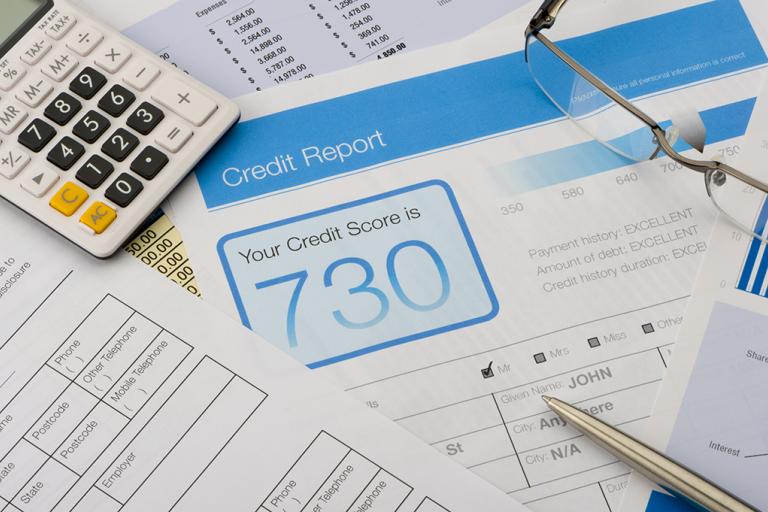On this page
What's next
Earn a high-yield savings rate with JG Wentworth Debt Relief
A Guide to Everything You Want to Know About Credit
by
JG Wentworth
•
June 21, 2022
•
12 min

According to a NerdWallet survey, only 9% of Americans know that most consumers have more than three credit scores. More than half don’t know that carrying a credit card balance month-to-month doesn’t help your score, and eight in 10 don’t know that closing an old, paid-off credit card can actually hurt their score.
Whether you’re just beginning to learn the basics of personal finance or you’ve been managing your money for a while, chances are there’s a lot you still have to learn about how credit works.
If you’ve ever found yourself scratching your head about anything credit-related, this is the guide for you.
What is credit?
Put very simply, credit is a commitment that a borrower makes to a lender to repay any borrowed amount (and any interest) in a timely fashion.
The three most recognizable types of credit are installment credit, revolving credit, and open credit.
Installment credit
Installment credit is an agreement wherein you (the borrower) receive a lump sum of money up front and repay it in regular payments, called “installments.” Repayment periods for installment credit are decided at the time the agreement is formed, even if the payments aren’t fixed amounts or if the interest rate on the loan might vary over the course of repayment. Once all installments are paid, the installment credit account is closed.
Common examples of installment credit include mortgages, student loans, personal loans, and car loans.

Revolving credit
Revolving credit allows you to continually borrow from your lender when you need it, rather than borrowing a lump sum up front, using a line of credit. There is no set repayment period for the amount you borrow, and you can pay off only part of your balance each payment period, instead of the full balance. Once you repay part or all of the borrowed amount, you can then borrow again up to the same credit limit.
Unlike installment credit, revolving credit accounts do not close when you pay them off. Additionally, because you can pay off the full borrowed amount each payment period, you could have a revolving credit account without ever incurring interest on your debt.
Credit cards and home equity lines of credit (HELOCs) are common forms of revolving credit.
Open credit
Monthly payment amounts for an open credit account may vary month-to-month, depending on how much you borrowed—but unlike a revolving credit account, you are expected to pay off the full balance each payment period.
Typically, utility bills like water, gas, cell service, and cable are considered open credit.
Credit scores
Your credit score is a number, sort of like a “grade,” that provides a snapshot of your credit history at the time that the score is calculated. See: Understanding Credit Scores

How is my credit score calculated?
While you might assume that credit scores are determined by a singular scoring model, most people have multiple credit scores based on hundreds of different scoring models!
Most lenders work with one of the three major credit bureaus: Equifax, Experian, and TransUnion. These bureaus collect data on your credit history to create credit reports, which are used to generate your score.
You’ve probably heard of a FICO score, which is the scoring model that these three bureaus use—and therefore the model with which most people are familiar. The typical FICO model, introduced by the Fair Isaac Corporation in 1989, presents scores on a numerical range from 300 to 850.
The score is calculated with a patented formula using the information the bureau has collected in your credit report. The higher your FICO score, the better your credit.
What is a good credit score? What is a bad credit score?
As noted above, the most common credit scoring models rate people on a scale from 300 to 850. Scores are categorized as “Bad,” “Fair,” “Good,” and “Excellent.”
- Bad: 300-629
- Fair: 630-689
- Good: 690-719
- Excellent: 720-850
How can I find my credit score?
Americans are guaranteed the right to receive their FICO score for free from one of the major credit bureaus once a year. If you wanted to get a hold of your FICO score outside of that annual timeframe, you would have to purchase a report from one of the credit bureaus.
But many credit card issuers offer free credit scoring to their clients; check your card statement for more information.
You can also get scores from FICO’s competitors using a number of free services, which will give you a good idea of where you stand with potential lenders. There are lots of websites and personal finance apps that allow you to check your scores regularly—just do your research and make sure they’re legitimate before you input any of your information.
What information is included in a credit report?
Your credit report includes personal identification information, plus a list of current and past accounts, payment history, negative marks that indicate risk to a lender, and a record of who has accessed your credit history.
Negative marks on your credit report due to issues like missed payments, collections, bankruptcies, repossessions, or foreclosures must be removed from your report after a set period of time—typically seven years.
The credit bureaus get the information included in your report from your creditors, who willingly share information like your payment history and inquiries with the bureaus. Although your lenders aren’t required to report your information, they share it with the credit bureaus because they also use the data collected by the bureaus to make decisions about the risk of lending to a given person. Lenders might not choose to share information with all three bureaus, so your credit report may look different from bureau to bureau.
Data around repossessions, bankruptcies, and foreclosures are accessible to the credit bureaus by way of public record.
Regular bills like utility bills and rent don’t typically end up on your credit report unless there’s a payment issue that leads to your account being sent to collections or an eviction.

How can I dispute incorrect information on my credit report?
Part of the benefit of regularly checking your credit report is that you can monitor any accounts opened under your name. This can help you remain vigilant against the threat of identity theft and ensure that the data being used to score your credit history is completely accurate.
If you’ve checked your credit report only to find that some of the information in your history is inaccurate, you should first file a dispute with the reporting bureau. Include details in your claim about what’s incorrect and documentation that can help support your claim. You should also dispute the information with the company that provided the incorrect data to the reporting bureau (called the “furnisher”).
Once you submit your dispute, the credit reporting company must investigate your claim thoroughly, unless it deems your dispute to be frivolous.
Credit pulls
Credit inquiries, or credit pulls, are when you or a lender check your credit score.
Hard credit pulls
Hard credit pulls happen when a financial institution conducts an official review of your credit history in order to decide the risk of lending to you. A company will only perform a hard credit pull if you officially apply for credit with them.
A hard credit inquiry can hurt your score by a few points for about six months and typically remains on your credit report for around two years. Having one or two hard pulls in a short period is unlikely to affect your credit score by much. However, having more than that might significantly lower your score because lenders look at multiple credit applications in a short period of time as a sign of risk. Therefore, it’s important to do your research and learn as much as you can about the terms of the credit account you’re interested in applying for before you finalize your application.
Soft credit pulls
Soft credit inquiries don’t affect your credit score at all. These types of credit pulls can be performed, for example, by employers who want to run a background check on you or potential lenders who want to see if you pre-qualify for an offer.
You can also run soft credit inquiries on yourself just to monitor your standing for when you decide to apply for credit.
How can I build good credit?
To build your credit, you need to know what behavior affects your credit score. Major factors include:
- Payment history. This is an obvious one: making payments on time helps your credit score, and making late payments (or letting your account go to collections) can bring your score down.
- Age of credit. This refers to the average age of your credit accounts and how long you’ve had credit. Every time you open a new account, you’re lowering your average account age, which can have a big impact if your average age is already relatively low.
- Whether you have more than one type of credit. Having both installment loans and revolving credit looks good for your credit score.
- Credit utilization. You may have a high line of credit—but running a high balance, too, can negatively affect your score. You’ve heard of “maxing out” your credit cards, right? Don’t do that.
- Recent credit applications. When you apply for a new credit account, the “hard inquiry” or “hard pull” into your credit history can negatively affect your score for up to six months—so don’t go saying yes to every cashier who pitches you their store credit card! Do your research on credit account terms before you apply.
If you’re trying to build your credit, it’s crucial to keep these points in mind as you spend, pay off accounts, and apply for new accounts. Getting a good credit score requires restraint and strategy.
What can I do with a good credit score?

It’s common knowledge that having a good credit score makes life easier when you’re applying for mortgages, credit cards, car loans, and even some jobs. But what if you don’t plan to make any major credit applications anytime soon? There’s actually a lot you can do with a high credit score.
If you have great credit and can stand to take a small hit to your score, you could apply for better credit cards than the ones you have—ones with better rewards, more cash back, and so on. You could refinance your mortgage or reduce your monthly payments. You could apply for debt consolidation loans or low- to no-interest balance transfer credit cards. You could even call your car or home insurance provider and ask them to renegotiate your premiums. (Yes, your credit score affects your premium payments!)
In short, there are tons of things you can do with a good credit score. It’s well worth your hard work!
What should I do if I’m struggling to repay my debts?
If you’re drowning in debt, you have options for resolving it! JG Wentworth could help you lower your debt and pay it off faster with our Debt Resolution Program, accredited by the American Fair Credit Council.*
Resolving your debt with us can help you get a fresh start, so you can focus on improving your credit score and moving on to a better financial future. We make the process simple for you by negotiating with your creditors on your behalf and tailoring a repayment plan to fit your needs.**
If you’re interested in learning more about your debt resolution options with us, call (888) 505-1794 today!
Sources Cited
- El Issa, E. (2016, March 8). Most struggle with credit basics – do you? Try this quiz. NerdWallet. Retrieved from https://www.nerdwallet.com/article/credit-cards/credit-card-cardholder-understanding-quiz
- Bernardi, L., & He, R. (2021, July 21). Understanding different types of credit. Time. Retrieved from https://time.com/nextadvisor/credit-cards/understanding-types-of-credit/#:~:text=What%20Are%20the%20Different%20Types,repaid%20with%20a%20different%20structure
- Luthi, B. (2021, August 4). An essential guide to how credit works. Experian. Retrieved from https://www.experian.com/blogs/ask-experian/how-does-credit-work/#:~:text=Credit%20is%20an%20agreement%20you,interest%20and%20possibly%20other%20fees
- How credit works. The University of Oklahoma. (n.d.). Retrieved from https://www.ou.edu/moneycoach/financialeducation/credit
- O’Shea, B. (2021, October 13). What are the three credit bureaus? NerdWallet. Retrieved from https://www.nerdwallet.com/article/finance/3-credit-bureaus
- O’Shea, B. (2021, December 14). What is a FICO score? FICO score vs credit score. NerdWallet. Retrieved from https://www.nerdwallet.com/article/finance/fico-score
- Credit reports and scores. USAGov. (n.d.). Retrieved from https://www.usa.gov/credit-reports
- DeNicola, L. (2021, October 8). What you need to know about the 3 main credit bureaus. Credit Karma. Retrieved from https://www.creditkarma.com/credit-cards/i/three-credit-bureaus
- How do I dispute an error on my credit report? Consumer Financial Protection Bureau. (2021, October 19). Retrieved from https://www.consumerfinance.gov/ask-cfpb/how-do-i-dispute-an-error-on-my-credit-report-en-314/#:~:text=If%20you%20identify%20an%20error,documents%20that%20support%20your%20dispute.
- Harzog, B. (2021, October 6). What can you do with a 760 credit score? U.S. News. Retrieved from https://money.usnews.com/credit-cards/articles/things-to-consider-when-your-credit-score-reaches-760
Learn more about our Debt Relief Program.
If you’re drowning in debt, JG Wentworth is here to help! Our team can help you lower your debt and pay it off faster. Want to learn more? Fill out your information, and we’ll be in touch soon.
About the author
Recommended reading for you
*The debt relief program is provided by JGW Debt Settlement, LLC. JGW Debt Settlement, LLC is licensed/registered to provide debt settlement services in states where licensing/registration is required. Debt relief program results will vary by individual situation. As such, it may not be suitable for all persons. JG Wentworth does not offer debt relief services in all states and fees may vary from state to state. Not all debts are eligible for enrollment. Not all individuals who enroll complete our program for various reasons, including their ability to save sufficient funds. Savings resulting from successful negotiations may result in tax consequences, please consult with a tax professional regarding these consequences.
**The use of debt relief services can potentially have an adverse impact on your credit rating, may result in you being subject to collections, and may result in other adverse action by creditors or collection agencies. Read and understand the program contract prior to enrollment.






